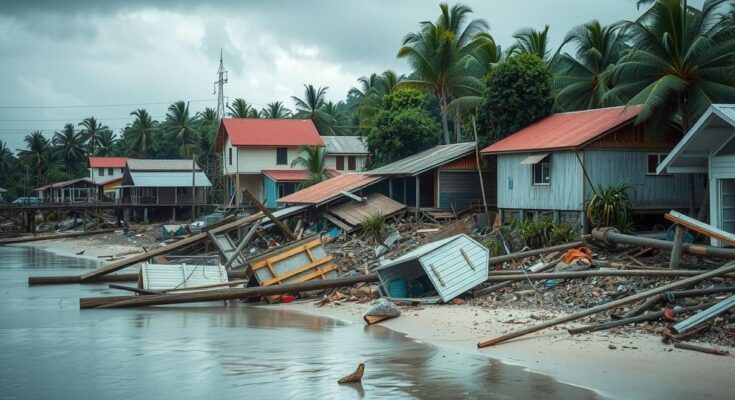Cyclone Chido has wreaked havoc on Mayotte, with winds of over 220 km/h causing widespread destruction. The storm, described by locals as catastrophic, has resulted in confirmed fatalities and substantial damages to infrastructure, including hospitals and communication systems. The affected population faces severe challenges as rescue efforts are hampered by accessibility issues and ongoing humanitarian needs. Long-term strategies are needed to address the vulnerabilities exacerbated by climate change.
In the aftermath of Cyclone Chido’s devastating impact on Mayotte this past Saturday, extensive destruction is evident across the French territory. The cyclone, classified as a Category 4 storm, brought with it winds exceeding 220 kilometers per hour (136 miles per hour), rendering the region nearly unrecognizable. Local residents have drawn chilling comparisons, likening the devastation to an atomic bomb explosion. Reports indicate that the cyclone has resulted in significant casualties, with local government officials suggesting that the death toll might reach upwards of a thousand, although only 14 deaths have been officially confirmed thus far.
Over 300,000 residents of Mayotte face catastrophic conditions as the storm rendered entire neighborhoods uninhabitable. Essential infrastructure, including hospitals, schools, and communication systems, has sustained severe damage, complicating rescue and recovery efforts. Many survivors currently lack access to electricity and clean water, trapped in their homes without aid. The regional government is struggling to assess the full extent of the calamity, with two-thirds of the island reportedly inaccessible due to the storm’s destruction.
In addition to the destruction caused by Cyclone Chido, underlying challenges in Mayotte, which include poverty and significant undocumented migration, have exacerbated the impact of this disaster. The territory, located in the Indian Ocean, has historically been vulnerable to severe weather phenomena. Meteorologists have consistently noted an increase in cyclone intensity, attributed to climate change and warmer ocean temperatures. As the island attempts to recover, extraordinary humanitarian assistance from France is underway, with rescue missions being initiated to support the affected population and assess damages thoroughly.
Mayotte, situated in the Indian Ocean, has long grappled with socioeconomic challenges and extreme weather events. Cyclone Chido, the most severe storm to impact the region in over ninety years, underscores the vulnerability of territories such as Mayotte. These areas often face devastating cyclones, which scientists warn are becoming more frequent and intense due to climate change. With a significant population of undocumented migrants, recovery efforts are complicated by the socio-economic landscape, which includes high unemployment rates and extensive informal settlements. The historical context of Mayotte, as the poorest territory in the European Union, also contributes to the urgency of humanitarian aid and infrastructure rebuilding efforts post-disaster.
The tragic events following Cyclone Chido’s strike on Mayotte highlight the precariousness of life in this French territory. With widespread devastation, widespread fatalities anticipated, and infrastructure heavily damaged, efficient recovery will require both immediate humanitarian aid and long-term rehabilitation plans. As climate change continues to intensify weather patterns, regions like Mayotte must be equipped with better preparedness and response strategies to mitigate the impacts of future natural disasters. The solidarity from national and international communities will be paramount as Mayotte begins to heal and rebuild from this catastrophic event.
Original Source: www.accuweather.com




